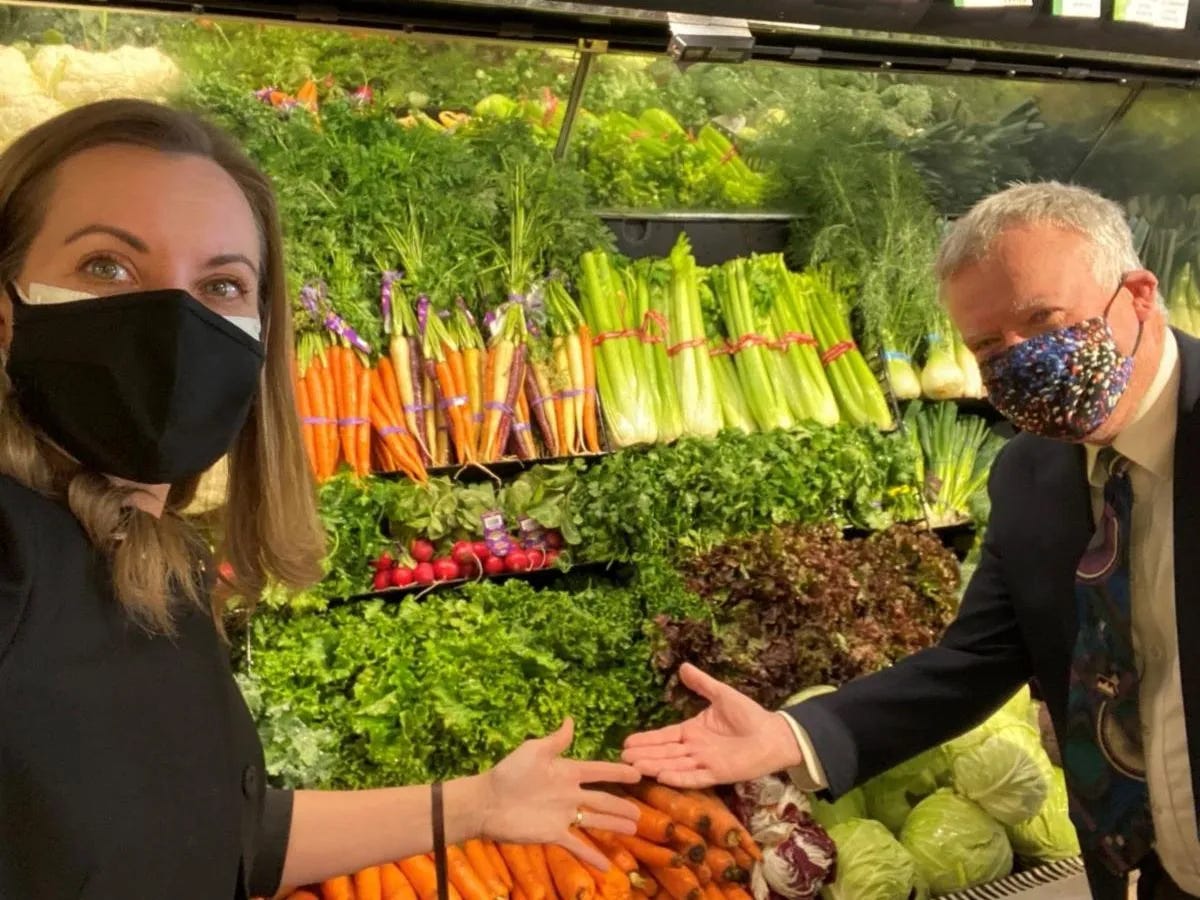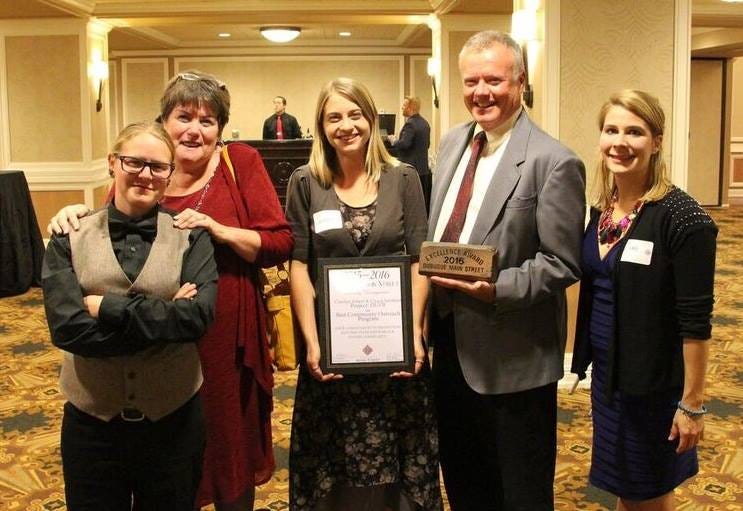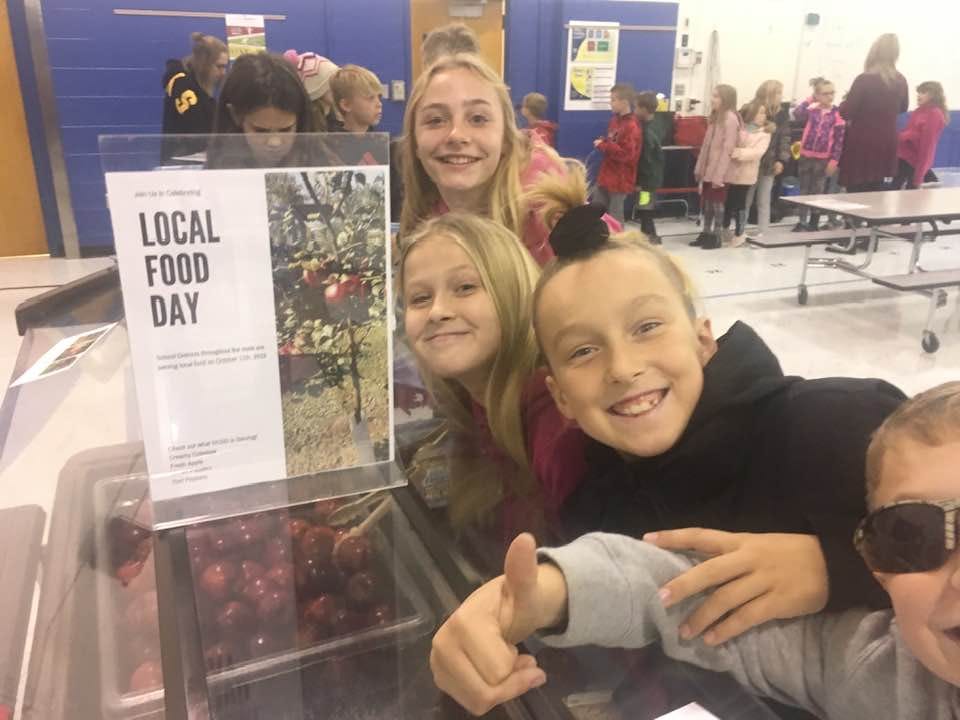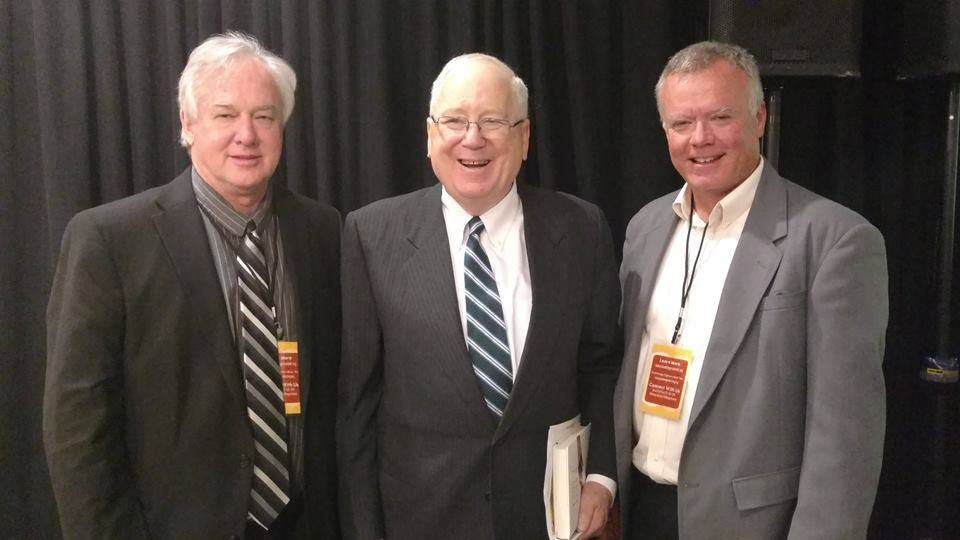Neither the Iowa Legislature nor the Iowa governor are willing to make sure school kids have enough to eat, especially in the summer. But both the House and Senate now seem eager to dictate what people eat: Iowa’s “unique regional food sources” — mainly, it seems, products of confined animal feeding operations.
With Senator Sarah Trone Garriott at Gateway Market, promoting Double Up Food Bucks during the pandemic.
For several years, I sponsored legislation in the Iowa House to support the Iowa Healthiest State Initiative program called Double Up Food Bucks. (Gov. Reynolds helped start Iowa Healthiest State when she was lieutenant governor.)
In 2021 -- in the midst of the Covid pandemic that led to greater food insecurity -- Polk County Senator Sarah Trone-Garriott introduced a similar bill in the Senate. We met up at Des Moines’ Gateway Market for a photo shoot! Sarah continues to be a champion for combating childhood hunger.
Double Up Foods Bucks is an incentive program that provides vouchers to users of the federal Supplemental Nutrition Assistance Program. The vouchers (food bucks) give families the ability to double their purchase of food using their SNAP cards if they buy fruits and vegetables: Healthier and possibly fresher than the cheaper calories with less nutrition they might otherwise buy.
Most farmers’ markets accept Double Up Food Bucks, so smaller growers and local (rural) economies benefit. I enjoyed working with Michaela Freiburger of Dubuque Main Street, Carolyn Scherf-Ryan of Dubuque County ISU Extension, the City of Dubuque, Dubuque County and the Community Foundation of Greater Dubuque to get the program started in my home town.
In some states, projects called Food Rx are set up that allow health care providers to offer fruit and vegetable food bucks as “prescriptions” for low and moderate-income patients. In Iowa, a similar program is called Produce Rx.
One year a couple of Republican legisalators – Crawford County Senator Jason Schultz (who was elected with me to the Iowa House in 2008) and Marion County Senator Ken Rozenboom -- seemed to take an interest, but eventually went radio silent.
This year, the Republican silence ended.
Fayette County Rep. Chad Ingels and 32 Republican House members introduced House File 920. It reads eerily like what Senator Trone-Garriott and I introduced. No problem. Progress? The bill sits unseen in the Appropriations Committee, where it grows its own eyes like potatoes. So does a Senate version.
Instead, on March 20, on a party line vote, the Iowa House approved House File 970. The bill includes a $1 million appropriation for Double Up Food Bucks, if matched with local dollars (really, a pittance, considering the SNAP program brought $529 million in federal benefits to 259,000 Iowans in 2024).
The string attached, the trojan horse trade-off? Before the funds become available, the state must first seek and get a waiver from the United States Department of Agriculture to let Iowa politicians and their appointed rule-makers decide what foods people can buy with their SNAP benefits: Only “healthy food based on necessary nutrition for good health,” a vague standard to be negotiated/rubber-stamped by a new bureaucracy (after Iowa just streamlined government by getting rid of other, unnecessary boards and commissions, like the Council on Homelessness).
By the way, the money for DUFB would be for one year. Presumably, the committee and SNAP rule changes are intended to be forever — indeed, Iowa standards can’t be rescinded except by the Legislature, according to the bill.
Double Up Food Bucks recognized at the annual dinner of Dubuque Main Street as the best outreach/promotion of 2016. Carolyn Scherf and Dubuque County ISU Extension played the lead role. Others who made it happen: Andie Donnan, Michaela Freiburger and Colleen Myers.
Don’t get me wrong, I would be happy as a disappearing lark if the USDA would cut candy, soft drinks and other highly processed “junk foods” from the program. Why won’t that happen? Can you say the words “lobbyist checks and Super PACs?” Until we get campaign finance reform (Citizens United needs to be overturned), the political beatings will continue until citizen morale improves. In this case, the strongarms at the federal level are owned by the U.S. Beet Sugar Association, American Crystal Sugar, American Sugar Alliance, the Corn Refiners Association, the Snack Food Association, the National Grocery Association, the Salt Institute…the list goe on.
But except for being one more way to micro-manage the lives of Iowans, limiting junk food purchases is not what supporters of the bill really want. That’s just the bogeyman that keeps Iowans ginned up. To hear the rest of the story, turn the channel to the Iowa Senate Agriculture Committee (not Education or Human Resources), which has approved a bill already passed by the House “modifying provisions related to school meal programs.”
The legislation attempts to disconnect Iowa from federal school nutrition guidelines. The nutrition standards for school meals was just updated in May 2024 after extensive public comment. There is some question whether the U.S. Secretary of Agriculture has extensive authority to allow exemptions, but that might not be much of a brake on the Trump Administration.
The Iowa bills require the Department of Education to submit a waiver request to USDA exempting Iowa from standards related to salt, whole grain, fruits and vegetables in school breakfast and lunch programs. Instead, the state would develop guidelines that align with “Iowa’s dietary recommendations or cultural food practices” – specifically “animal-based protein and dairy.”
Notice the word “or” — healthy meals can play second fiddle as plates are filled with excess corn-fed red meat and dairy. “Animal-based protein” is first and fruits last on a list of food groups that are to be prioritized “in the order listed.”
The bill also dictates that school health curricula for all grades starting with kindergarten “emphasize the importance” of animal-based protein and dairy. While we must be achieving optimal consumption of fruits and vegetables, apparently getting kids to eat their cheeseburgers and corn dogs has been a growing problem.
Students at Sageville School in Dubuque mug it up on Local Food Day, where State Rep. Lindsay James and I visited in 2019. Sageville was one of the first to start a school garden in Dubuque, so students could learn first-hand what “local sourcing” meant.
The bill also makes a big deal out of teaching kids the value of “local sourcing” of foods. Some advocates believe this is an open window through which multi-national conglomerates run by food barons with facilities in Iowa can take advantage of programs such as Choose Iowa meant for beginning farmers and locally-owned small producers.
The dots are not easy to connect, but USDA rules do allow “local procurement options for program operators by additionally allowing ‘locally grown, raised, or caught’ to be used as a procurement specification (i.e., a requirement) in soliciting unprocessed or minimally processed food items…The final rule does not specify a definition of local for such purposes; rather, it allows state agencies and program operators to adopt their own definitions.”
Predictably, the bill is supported by Iowa corn, pork and cattle producers. Notably absent is the Soybean Association, which is presumably concerned about their soy milk and tofu sales, two examples of soybean-based protein. No health or education group favors the legislation.
Turkey, poultry and egg producers are curiously missing-in-action; then again, until the recent explosion of egg prices, all of those proteins tended to be less expensive than red meats and therefore relatively common on school meal menus. So maybe they think might lose out in this deal.
(By the way, I say all of this as someone who makes a pretty mean beef chili, always falls for the beef taco specials and gorges on sausage biscuits more mornings than I eat my banana or put blueberries on my cereal.)
While Iowa legislators are keen to dictate what people can eat, they and the governor have been notoriously AWOL when it comes to making any state investments to address hunger. In addition to spurning Double Up Food Bucks, the governor routinely ignores requests from the Iowa Food Bank Association to be included in her budgets. Gov. Reynolds stubbornly refused to authorize a small administrative match to accept $29 million so Iowa school kids can be included in the USDA Sun Bucks/Summer EBT program. And, so far, crickets on the $11 million in Trump Administration cuts to programs that allow schools and food banks to buy from local farmers.
Bills like those I once offered to make school breakfasts and lunches free for all Iowa school kids or assist schools and school districts in purchasing fresh farm produce to alleviate hunger and improve school performance go…nowhere. “Food deserts” – created in part by the closing of locally-owned groceries, especially in rural Iowa – is a phrase that doesn’t seem to be in the Republican dictionary (except the version owned by Rep. Ingels and Polk County Rep. Brian Lohse).
Almost all the money Iowa politicians want to control comes from the federal government. We want the money but not the rules. To understand the nitty-gritty, I recommend that nerds (more introverted than geeks) peruse the fiscal notes on the school meals bill. Iowa’s under-appreciated, non-partisan Legislative Services Agency (LSA) does a bang-up job analyzing and explaining the financial workings and impacts of legislation.
According to the LSA report: Iowa receives $145 million for the National School Lunch Program and $40.3 million for the School Breakfast Program for 19.6 million breakfasts and 57.6 million lunches. Another $23 million comes to help schools buy a portion of the food used in their meals. Gaining control of this money will create a half million dollar state bureaucracy and could result in an unspecified loss of federal reimbursements to schools.
As she has said about money Iowa gets from the U.S. Department of Education, Gov. Reynolds would no doubt prefer to have the SNAP and school meal programs be turned into block grants that the state can control (and privatize?) with no strings attached.
As a member of the Ag Task Force of the National Conference of State Legislatures, we learned from the experience of others “on the ground” how to work effectively to address food insecurity, healthy diets and local food production. This visit was with Common Good City Farm in Washington, D.C. Iowa State Senator Annette Sweeney is bringing the group to Iowa in 2025. I hope they visit Feed Iowa First.
Most hunger advocates believe the attacks on dietary guidelines is really a battle in a war to end all of the USDA’s 16 food and nutrition programs. Considering the federal dismantlement that has been occurring since January 20 – hard to say that fear is overblown.
For six years, I served on the General Assembly’s Joint Appropriations Subcommittee for Economic Development (yes, the Iowa House and Senate used to meet together). The president of the World Food Prize Foundation, Ambassador Ken Quinn, would come before the committee every year seeking bi-partisan support for the state’s $1 million contribution to the World Food Prize.
Every year, I reminded the ambassador: You know, Iowa is part of the world. To his credit, he listened. I appreciated that. He did some things. Started the Iowa Hunger Summit, for example.
State Senator (then State Rep.) Art Staed and I regale Ambassador Ken Quinn, president of the World Food Prize, at the Iowa Hunger Summit in 2016. Ambassador Quinn and the World Food Prize Foundation worked with Senator Bill Dotzler and me to spot $25,000 to the Iowa Healthiest State Initiative to launch the Double Up Food Bucks program at farmers' markets in Iowa.
So, I am curious to hear what the Des Moines-based group -- now led by former Iowa Governor and USDA Secretary Tom Vilsack -- has to say about all of this. Secretary Vilsack was responsible for those food and nutrition programs for 12 years.











